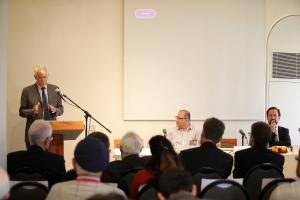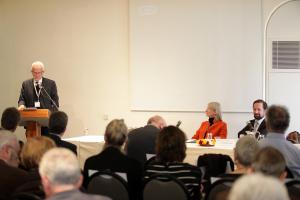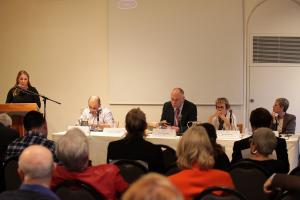The director of the Konrad-Adenauer-Stiftung in Israel, Dr. Michael Borchard warmly welcomed the participants and guests to the event. He sent his special greetings to the Honorary Chairman of the Konrad-Adenauer-Stiftung and former Minister-President of Thuringia and of Rhineland-Palatinate, Prof. Bernhard Vogel, to the former Federal Minister of Education, Science, Research and Technology and former Minister-President of North Rhine-Westphalia, Prof. Jürgen Rüttgers, as well as to a delegation of the University of Bonn with Prof. Michael Hoch as its rector. Dr. Borchard raised the question if the birthday that we celebrate today is really a reason to celebrate or have there been developments in the last years that give as cause for reconsideration? According to a recent survey by the Konrad-Adenauer-Stiftung the Israeli citizens have been losing trust in the EU constantly for the last few years. Among the reasons mentioned were the increasing Anti-Semitism in Europe, the settlement discussion and Europe’s reaction to the Arab Spring. However, Dr. Borchard pointed out that the EU and Israel have more things in common than things that are driving them apart. Shared values and shared interests should be the focus of the relations between the EU and Israel in the future. Dr. Borchard concluded his speech by saying that the Israeli-EU scientific cooperation is one of these common interests and projects which enforce the relations in every way and this is one reason, why we are proud to have this event today.
After short greetings to the participants and guests, Prof. Sharon Pardo, chair of The Centre for the Study of European Politics and Society at the Ben-Gurion University of Negev, devoted his speech to Prof. Jürgen Rüttgers, who was one of the founding fathers of the EU-Israel "Association Agreement" signed in Brussels, on the 20th of November 1995, between the EU and Israel. Prof. Rüttgers dedicated his life to Israel, Germany and the EU as well as to research, innovation and development. For that reason the EU integration process is in-debted to the achievements of Prof. Rüttgers, concluded Prof. Pardo.
The last words of greetings were given by Mr. Lars Faaborg-Andersen, the Head of the Delegation of the European Union in Israel. In his speech, Mr. Lars Faaborg-Andersen pointed out, that Israel and the EU have 85 percent of common interests and only 15 percent on which both parties do not agree – contrary to what is suggested by the Israeli media. While one of the disagreements is the different view of the Israeli-Palestinian conflict, a major part of the 85 percent is the cooperation in science and economy. According to Ambassador Faabog-Andersen, there is no other country in the world, with whom Israel has such comprehensive relations as with the EU. Due to this fact, the EU and Israel have to deal with the other 15 percent so that the fruitful cooperation in science and economic spheres could be expanded to other fields in the future.
The Opening Speech of the conference was delivered by Prof. Jürgen Rüttgers, Former Federal Minister of Education, Science, Research and Technology and former Minister-President of North-Rhine-Westphalia. Prof. Rüttergs set the focus of his speech on the question how the world has been changing in the last few couple of years. The increasing population growth, war, violence and starvation are the main issues of the 21st century while the stock of knowledge increases constantly. An economy that wants to remain competitive today has to generate new technologies and innovations at a stretch. “If you stand still these days, you will fail” said Prof. Rüttgers. To manage with these issues, the only way is to work and cooperate with partner countries. The scientific cooperation between Israel and the EU, which started 20 years ago and is nowadays a huge network with different programs and projects, shows how Israel and the EU can benefit from working together. Back at the time, Israel took the chance and since has grown to become a “Start-up Nation” par excellence in the last 20 years – with the EU as its most important partner. Today, Israel is one of a few non-European countries that get access to the European program Horizon 2020 and thereby to a budget of 77 billion Euros. Prof. Rüttgers also spoke about the social changes that are happening in almost all of the Western countries. Our societies are changing: changes in values, changes in politics, changes in behavior and changes in what people do believe in. “Post truth world”, Prof. Rüttgers said, is a serious phenomenon that Western countries and their governments have to deal with. If we don’t find a solution to overcome this situation, our nations won’t have a future. Prof. Rüttgers concluded his speech by saying that universities and educational institutions as carriers, protectors and witnesses of our culture will play a big part in finding a solution to this problem.
The second speaker was Prof. Ute Deichmann, Director of the Jaques Loeb Center for the History and Philosophy of the Life Sciences at the Ben-Gurion University Negev. Prof. Deichmann highlighted the topic of scientific cooperation from a historical point of view. Her presentation “The Beginnings of the Israeli-German Collaboration in the Sciences: Scientific and Political Interests” focused on the initiators and their scientific and political rationales, while initiating the Israeli-German collaboration in 1956. According to Prof. Deichmann, the huge scientific effort, which was generated through the collaboration, had to face moral costs, caused by the remains of the Second World War. What was unthinkable a few years after the war became a story of success only half a century later.
The keynote speech of the conference was delivered by Prof. Bernhard Vogel, Honorary Chairman of the Konrad-Adenauer-Stiftung and former Minister-President of Thuringia and of the Rhineland-Palatinate. In the beginning of his speech Prof. Vogel talked about a paradox situation regarding the current relation between Europe and Israel: “At the same high rate in which the bilateral cooperation has been intensified and improved considerably, Europe and Israel have grown apart from each other for the last few years”. “The relations never have been so intensive, far-reaching and comprehensive and on the other hand and at the same time that tense like today”, he said. There is no other country or association with whom Israel has such a comprehensive and fruitful relation. This cooperation is an unique relationship that generates a win-win situation for both parts: Without the EU funding – not least within the project „Horizon 2020“– the high scientific standard of Israeli universities would be in a danger for sure. At the same time, Israeli access to the economic and technological zone in Europe is very important, as the international competitiveness of Europe would be weaker, if it wouldn’t have such good relations to the “start-up nation” Israel. In Prof. Vogel’s opinion, both sides highly benefited from their special and unique partnership. Europe and Israel are not only part of a shared community of values but – as the upheavals in the Middle East and North Africa have shown – in the end also part of a shared community of security. It may be that some European decisions have contributed to disappointment in Israel. Prof. Vogel finished his speech with by concluding that the shared values of the EU and Israel should become the focus of attention again: Democracy, freedom, rule of law as well as an open economy which is based on market principles. However Besides this, the EU and Israel should pay more attention to their shared interests which are wealth, competitiveness and security.
The first Panel of the day dealt with the Researchers’ Perspective of the scientific cooperation. The Panel was chaired by Mr. Moshe Amir, Director of the Bologna Training Center at the Ben-Gurion University of the Negev. Mr. Moshe Amir pointed out that the idea of the first panel is to have a look of the perspective of the Israeli and European scientists 20 years ago. Back then, establishing this kind of partnership was intense, exciting, turbulent and difficult at the same time. Since there was a strong focus on basic science in Israel, there was a different scientific culture in Israel and the EU. Amir Moshe raised the questions to the speakers, to see how this was played out by the scientists. Dr. Meir Zadok, Executive Director of the Israel Academy of Science and Humanities, highlighted the excellent relations between Germany and Israel, mostly on an individual basis – even before the cooperation with the EU has begun. Prof. Michael Hoch, Rector of the University of Bonn told that in 1996 he worked at the Max-Planck-Institute in Göttingen. There he and his colleagues had the chance to meet Israelis and to exchange their different scientific cultures, and he has using the insights and experiences he made there in his following jobs. Today as the rector of the University of Bonn, it helps him to understand how important is the exchange between young scientists, especially for the research institutes in Germany. Dr. Jennifer Oser, from the Department of Politics and Government at the Ben-Gurion University of the Negev, Told how she has benefited from the EU scientific cooperation through funds for her post-doctoral program. She pointed out, that she wouldn’t be able to participate in panels like this, without these funding, since there are not many possibilities for post-doctoral funds besides the EU funding. She also supported the idea behind the scientific cooperation: Exchange, as research and development don’t know any boarders.
Following a lunch break the participants gathered back for the next panel that dealt with the connection between Science and Politics. The panel, which was chaired by Prof. Sharon Par-do was opened with a speech from Member of Knesset Ksenia Svetlova from the Zionist union List. MK Ksenia Svetlova pointed out that the achievements of the universities and scientific institutions in Israel have been reached due to the cooperation with the EU. The project with the EU “Horizon 2020” proverbially opens new horizons for the scientific landscape in Israel and Israel benefited from the EU funds and every research program. However, MK Svetlova added that besides this strong scientific cooperation the EU and Israel have been drifting apart in the last years. MK Svetlova made it clear that it is up to her and her colleagues to deal with this situation and to reach some improvements in the near future in order to avoid different dangerous initiatives which are meant to undermine the Israeli-European relations. Mr. Christian Jörgens, the science and technology counselor at the German Embassy in Tel Aviv, followed MK Svetlova and raised some questions to the speakers: What will happen when the generation that has been establishing the scientific cooperation between Israel and the EU will retire? How will the change s in Germany and the EU affect this cooperation? And, what can science and technology contribute to improve the current situation between the EU and Israel? These questions, according to him, should be the focus of future debates on the relationship between Israel and the EU. Mrs. Alexandra Meir, the scientific officer at the Delegation of the European Union to Israel, set the focus of her speech on the science diplomacy. Science in diplomacy, diplomacy for science and science for diplomacy are important instruments of soft power to improve relations between states, she said. Especially science for diplomacy may build bridges between states or regions. One great example, Mrs. Meir pointed out, is the program “Horizon 2020” which has and huge and important impact on the cooperation between Israel and the EU. Mrs. Avivit Bar-Ilan, the director of Multilateral European Organizations at the Ministry of Foreign Affairs of Israel, has also highlighted the program “Horizon 2020” in her speech. The program is a flagship program for the good relations between Israel and the EU. Mrs. Bar-Ilan mentioned that the EU and Israel should use this program as an example for other areas in the European-Israeli cooperation. There are many more venues and opportunities to strengthen the relationship between them.
Following this political panel an informative session on the current cooperation between the sides was held. Dr. Aviv Zeevi Balasiano, Director of ICT-Security-FET at the Israel Europe R&D Directorate, held a presentation about Israel’s recent contribution in EU scientific pro-grams. Dr. Zeevi Balasiano explained how “The Israel-Europe R&D Directorate” (ISERD) aims at maximizing the benefits of Israel’s participation in the Framework Programs (FP) and helps Israeli scientists to apply for funding. ISERD is Encouraging Israeli entities to participate in the FP’s and other related programs and represents an interface between the Israeli government and the European Union for all FP matters. He talked about both the Israeli and EU perspective of the FP’s contribution and benefits for each of the sides. He went on exploring some of the facts and figures regarding the Israeli participation in various bilateral R&D projects and programs such as “Eureka” and Eurostars”.
Prof. Sharon Pardo made the final remarks of the conference by pointing out that the incitement in Israel against the EU should stop. He stressed that the look from the inside is always different from the look from the outside and that the relations between Israel and the EU should no longer be taken for granted. Since the EU and Israel are natural partners, there is no other future for Israel and the EU other than continuing cooperating with each other in different fields, and for that cooperation only “the sky is the limit”.






